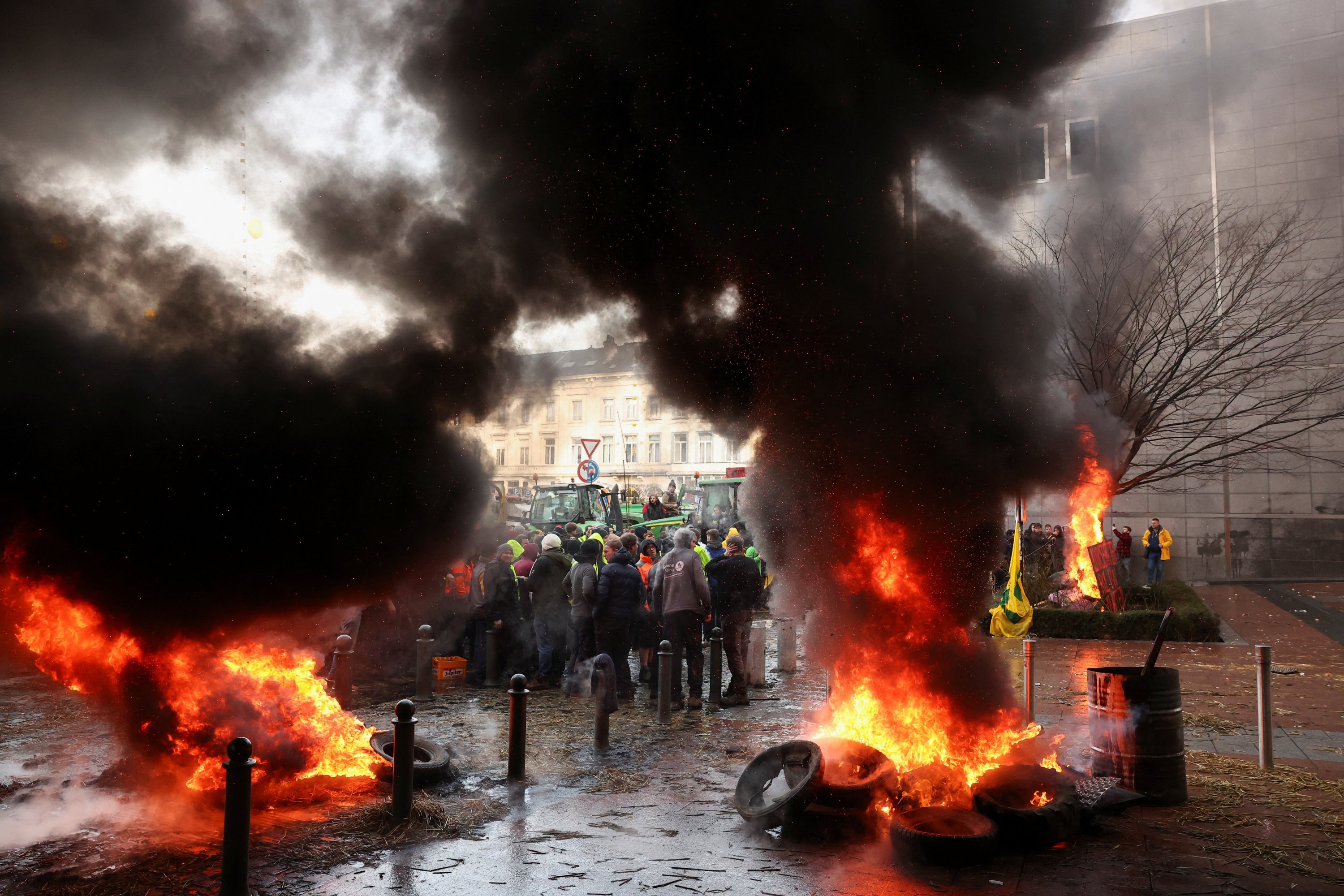© Turkuvaz Haberleşme ve Yayıncılık 2026
Protests by farmers across several countries in Europe reached their boiling point as they stormed the European Parliament on Thursday, throwing eggs and stones and starting fires in the area surrounding the building to press a summit of European Union leaders to do more to help them with taxes and rising costs.
Protesters tried to tear down the barriers erected in front of parliament – a few blocks from where the summit was taking place – but police pushed them back with water hoses. Police also fired tear gas.
After warming their limbs at burning piles of pallets overnight, the farmers started their vehicles. They entered the Belgian capital with the rumble of engines, firecrackers and blaring horns piercing the early morning slumber in a culmination of weeks of protests around the bloc.
A local official said a statue on the square where farmers were gathered near the parliament with their tractors was damaged.
Major thoroughfares in Brussels, the heart of the European Union, were blocked by around 1,300 tractors, according to a police estimate. Farmers from Italy, Spain and other European countries also participated in the protests.
Jean-Francois Ricker, a farmer from southern Belgium, braved the winter night close to EU headquarters and said he expected 1,000 to 1,400 vehicles. "There will be a lot of people. ... We are going to show that we do not agree and that it is enough, but our aim is not to demolish everything."
Security personnel in riot gear stood guard behind barriers where the leaders met at European Council headquarters.

Farmers say they need to be paid more, are choked by taxes and green rules, and face unfair competition from abroad.
The protests across Europe come ahead of European Parliament elections in June in which the far right, for whom farmers represent a growing constituency, is seen making gains.
"You know what's happening: European elections are coming and politicians and the European Commission are super nervous. And I think that this is the best moment that all the European farmers go to the street together," said Jose Maria Castilla, a farmer representing the Spanish farmers' union Asaja.
One tractor displayed a banner saying, "If you love the earth, support those who manage it," as farmers from Belgium and other European countries try to make themselves heard by EU leaders meeting later.
Another banner read: "No farmers, no food."
"If you see how many people we are here today, and if you see it's all over Europe, so you must have hope. We must have hope that these people see that farming is necessary. It's the food, you know," said Kevin Bertens, a farmer from just outside Brussels.
European Parliament President Roberta Metsola said: "To the farmers that are outside. We see you and we hear you."
Farmers have already secured several measures, including the bloc's executive commission proposals to limit farm imports from Ukraine and loosen some environmental regulations on fallow lands.
In France, where farmers have been protesting for weeks, the government has gradually dropped plans to reduce subsidies on agricultural diesel and promised more aid.
But farmers say that is not enough, and protests have spread to countries including Spain and Portugal.
Farmers have been protesting in many areas of Germany since December 2023, mainly against the government's plans to abolish subsidies for agriculture. Riding tractors, farmers rallied to the headquarters of the governing parties to protest against the planned cuts in agricultural diesel subsidies.
Following the protests, the German government said that instead of abruptly ceasing the tax reduction on agricultural diesel for farmers, they plan to reduce it by 40% in 2023 and 30% in 2025 and completely abolish it in 2026. As for the tax exemption on farming vehicles, they said they had given up on abolishing it.
Despite the government's response, farmers started a wider protest on Jan. 8, which spanned an entire week, disrupting highway access and staging a large blockade at the iconic Brandenburg Gate in Berlin, the capital of Germany.
In Germany's western neighbor France, the EU's largest agricultural producer, farmers are protesting the government and retailer efforts to curb food inflation, as these efforts resulted in high costs of energy, fertilizer, and transport. They have blocked roads and highways with tractors for days to get the government to hear their demands.
They also say that these "excessive regulations on environmental protection" cause them problems and that the government funding is insufficient.

Citing low incomes in several cities and the government's agricultural policies, including a ban on pesticides, farmers blocked roads to Paris, launching "the siege" of the city on Tuesday.
Similarly, farmers in Italy are protesting the EU's agricultural policies. Blocking roads with tractors, they are protesting low wages and price pressures.
While their Spanish counterparts decided to join the fight later on, as they announced on Tuesday they planned to protest against the EU regulations and lack of government support, farmers there took to the streets of the capital, Madrid, in January 2023 to protest the government's restriction on water from the Tagus, the longest river in the Iberian Peninsula, which is now drought-stricken after record temperatures in the country.
Farmers in the eastern part of the block, namely Romania, also joined the drive as they protested high labor costs last week, blocking access to the Ukrainian border crossing.
Poland farmers similarly protested with tractors last week against Brussels' policies, demanding the reinstatement of trade restrictions with Ukraine to prevent Ukrainian food products from flooding the Polish market and opposing the measures introduced by the European Green Deal.
Fed up with declining incomes, lengthy administrative procedures, and climate regulations, farmers in Belgium blocked a part of the Brussels Ring Road with tractors during rush hour, stopping the flow of traffic, while another group of protesters tried to draw attention to their problems by pulling their tractors in front of the European Parliament.
While the days of mushrooming discontent have been largely peaceful, French police arrested 91 protesters who forced their way into Europe's biggest food market Wednesday, the Paris police chief said. Armored vehicles block entrances to the sprawling site at Rungis, south of the French capital.
While the farmers' crisis is not officially on the agenda of the EU summit, it is bound to be discussed, at least on the margins.
With all eyes on Viktor Orban, as the other 26 EU leaders want to convince him at the summit to join a plan to offer stable financing to Ukraine, the Hungarian Prime Minister made a point of meeting farmers overnight.
"We need to find new leaders who truly represent the interests of the people," his spokesperson quoted him as saying, referring to the European Parliament elections. "The @EU_Commission should represent the interests of European farmers against those of Ukraine, not the other way around," he quoted Orban as saying.
As he arrived at the summit, Belgian Prime Minister Alexander De Croo said farmers' grievances should be discussed.
"They offer products of high quality; we also need to make sure that they can get the right price for the high-quality products that they provide," he said.
Meanwhile, Irish Prime Minister Leo Varadkar echoed French President Emmanuel Macron's opposition to signing a trade deal with the Mercosur group of South American countries in its current form – another key demand from farmers.
In France, where farmers stepped up protests at the start of the week, the impact of dozens of blockades is starting to be felt, said Eric Hemar, the head of a federation of transport and logistics employers.
"We did a poll among our federation members: all transport firms are impacted (by the farmers' protest) and have lost over the past 10 days about 30% of their revenue because we are not able to deliver on time or with delays," he told Franceinfo broadcaster.
However, the protests have already had a slight impact: The European Commission, the EU's executive branch, announced plans Wednesday to shield farmers from cheap exports from Ukraine during wartime and allow farmers to use some land that had been forced to lie fallow for environmental reasons.
